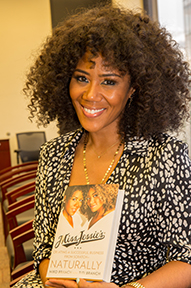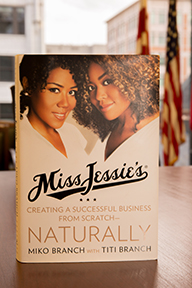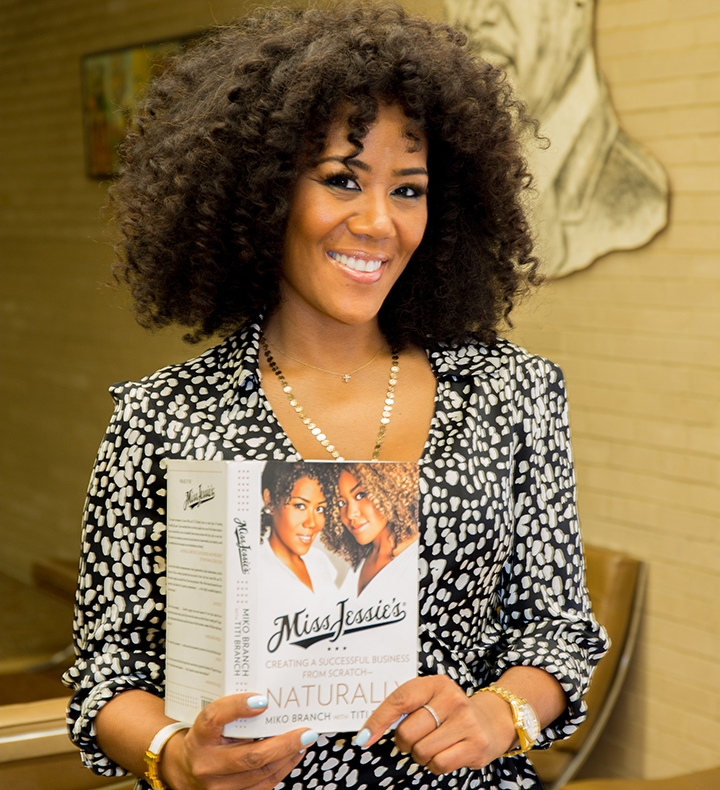I was delighted to spend time talking with Miss Jessie’s co-founder Miko Branch about her new book Creating a Successful Business From Scratch-Naturally. Many of you know the story, which started at the kitchen table of Miko and Titi’s grandmother when Miko and Titi were young children. Their parents were young and busy; and for the most part, sisters Titi and Miko Branch raised and entertained themselves. However, during the Summer they got to go to Miss Jessie’s house, their paternal grandmother. Miss Jessie is described as a no non-sense, resourceful and independent woman that ruled the family from her kitchen table. If she didn’t have it, she made it and that sense of creating something from nothing was instilled in the Branch girls from the beginning. Their father was also a great influence in teaching them the value of hard work and teamwork at an early age.
During this intimate discussion, Branch touched on the continued success of her popular hair care product line even after the untimely passing of her sister and co-founder, Titi Branch.
Parlé Magazine: Let’s start with Creating a Successful Business From Scratch-Naturally. Can you tell me more about the book?
Miko Branch: First of all the book is very special, it has come at a very important time. As you know I lost my sister and it’s a chance for me to tell her story, and her legacy is so wonderful. At the same time it’s about our story about being sisters, about the American Dream, it’s about how we built our business from scratch. Not only to tell our story, but we wrote this book to inspire others and we really believe that if we could do it—anyone can do it.
We have already inspired many women to go natural, so we’ve seen it and we know how much influence we have and we felt we could influence in the same way to start your own business, be independent and follow your dreams and inspirations.
Parlé: Where did the inspiration come from to write the book?
Miko: In October 2012, Titi came to me and said it was time. We had already known we were doing something special. We had uncovered women who thought they had kinky hair, really had a very tightly coiled curl. We wanted to spread that message in every way we could and finally we developed a product to support it. For generations women just did not know what we had and how valuable it was. We never really had time to tell our story because we were so busy building our business. We never had any investors; we never had any real help outside her and I being the principles in the business, but when we got to a place of getting some distribution, meaning Target; we decided we were going to do it. So we worked on it for about two years and finally here it is.
Parlé: How did you come up with the title?
Miko: Well the title, honestly we were a little stumped for the title because there were so many things we wanted to name this book. But I think what we choose really captures it. It embodies all the things we tapped into naturally to create this business from nothing and that’s really the important take-away here. So I think we did good on the title.
Parlé: What would your advice be to the woman who feels that “going natural” isn’t for me or it’s not for everyone.
Miko: I would say she’s absolutely right if she has tried to approach natural hair and found that double strand twisting my hair at night is not for me; using two jars of product is not for me, combing my hair out and breaking my hair off and trying to get a comb thru is not for me. And if she’s determined that she just doesn’t want to dedicate the time—then I think that’s a valid reason not to go natural and I support that. Because it’s about choice and although we specialize in curly, kinky, wavy hair—we are individuals first and support her choice. But then there’s the woman that wants to embrace her hair and there’s so much more information, so much more support, so much more expertise and it’s a wonderful time for anyone that wants to go natural to make that transition.
Parlé: Is going natural really all about the product?
Miko: I mean it’s really a combination, because a product pulls it all together to support it, but it’s also about the strategies and techniques. For instance you never want to try and comb your hair with a fine-tooth comb—that’s not a product, but you certainly want to approach it with the proper tools. You would also take into consideration all the little things that add to the big picture, but once you get that down pat there’s so much more information available. Again, I just think it’s a wonderful time to go natural.


Parlé: How has losing Titi, impacted the business and how do you find the strength to push forward so soon after the tragedy?
Miko: The loss of Titi is just devastating. We were sisters, but we spent so much time together. We weren’t just normal sisters or casual sisters—we were interactive sisters. She co-parented with me, we were roommates, we ran a business together and probably about 95% of my life was spent with my sister and I’m a woman in my 40’s now. I miss her so much; the family misses her so much.
But Titi and I were fortunate enough to create a lot of things together; we created a life together and a wonderful business together. And it was because we created it together—we both know how to run the business, there’s no job that either one of us couldn’t do, so in the absence of one, thank God the other one knows how to do it. So the business is solid, but the business could never compare to the loss of my sister.
Parlé: In brief, I wanted to discuss Titi’s depression, can you share a little about your perspective on what she was actually battling?
Miko: For many years we weren’t able to categorize or identify or put a label on her depression. You have to understand that in our family, depression wasn’t common. Culturally or in our extended family I don’t think we ever knew anyone that was clinically depressed. So maybe a mood or change in fluctuation in her didn’t strike us. We thought maybe she’s having a bad day; that was all while growing up. It wasn’t until later on in her adult life that I understood that Titi was clinically depressed at times. And she tried to battle it and she had a hard time.
Parlé: Was she seeking any professional help?
Miko: She was, Titi sought out help, she saw a therapist and there were times when she took medication to help balance her depression; but that was towards the latter part of her life. But looking back, I realize that in hindsight everything just happened so quickly but things will become clearer to me as I continue to look back and reflect on it. But honestly our family didn’t have an education on mental illness, what it looked like or what the signs were. But at a certain part in her adult life we understood that Titi was challenged with depression and that she was going through something.
Parlé: So it’s been in the media that the family is in a legal dispute with Titi’s former boyfriend. Before this happened, what was the family’s relationship like with him?
Miko: It is a legal matter, but I will say that I didn’t get a chance to really know that gentleman and clearly there are some serious concerns. I’m just going to have to let my attorneys handle it because it is a legal matter now.


It was an enlightening moment to sit down and discuss the trials and tribulations with Miko Branch on keeping her business thriving while still mourning the loss of her beautiful sister Titi. But in some small ray of hope, it definitely sheds light on awareness for depression and she warns others to watch for the signs in their loved ones. We all wish her continued success in all her future endeavors and we thank her for sharing her sister’s story in hopes of saving others.
Images by Jennifer H. Runyon for Parlé Magazine

